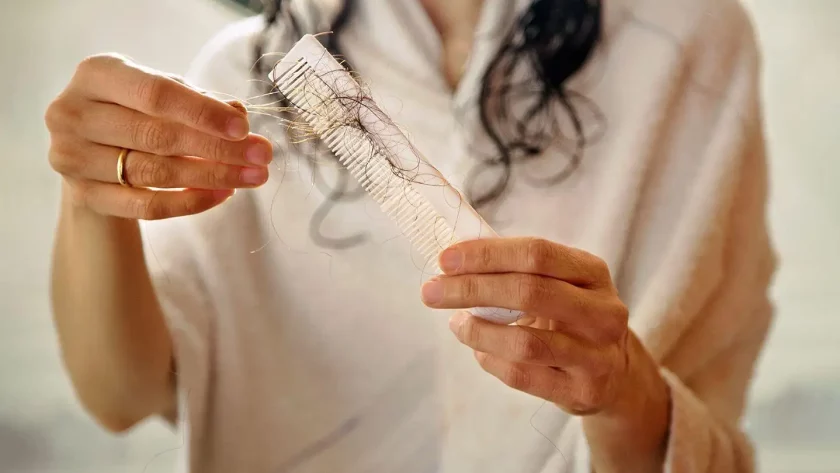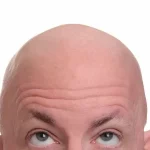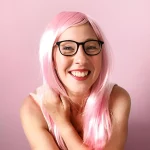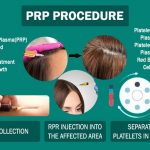It’s natural for your physical condition to undergo various changes as you get older. The process includes a shift in your hair’s appearance. Over time, your hair’s color and texture will change on its own. Thinner or less hair is a common sign of aging.
The encouraging news is that you can do things that will promote hair growth even after age 50.
Before you start, you can look at our ultimate guide to short hairstyles for the over 50s to learn more.
What Causes Hair to Thicken with Age?
Changes in hair color are a major sign of aging. Hair follicles are tiny, hair-growing organs found in the epidermis and scalp.
Less pigment is produced by the hair follicles as we become older. Because of this, your hair will start to grey.
It’s possible that your hair’s density will shift as well. Thick hair in adulthood often thins out and becomes shorter over time.
The hair strands gradually shrink. They could fall out more frequently or stop growing completely.
Why Does Hair Thinning Happen With Age?
Here are a few causes of hair loss in those over 50s.
Features that run in families
Hereditary characteristics are those that are inherited by offspring from their parents. Is the hair on one of your parents thinning, or do they have a family history of baldness? You probably will get it as well.
Menopause
The change in a woman’s reproductive system that occurs during menopause is known as the end of her monthly menstrual cycle. When this occurs, the body’s production of estrogen and progesterone is reduced as a result.
These hormones cause hair to grow more quickly and remain on the scalp for a longer time. A big reduction in hair occurs when there is a lower hormone concentration.
Hormonal problems
Chemicals known as hormones circulate into the bloodstream after being created by glands in the body’s endocrine system.
When there is an excess of one hormone or a deficiency of another, this can lead to hormonal imbalance. Many endocrine conditions can be associated with hair loss.
Inconsistencies in nutrition
Hair loss might occur if you don’t have enough of the right nutrients in your diet.
Thyroid conditions
When your thyroid isn’t functioning properly, it could affect your body’s ability to produce hormones. Root hair growth is included in this.
Hair loss can be permanent because new hair growth doesn’t always occur. The hair on your head, including your eyebrows, may be thin.
Less hormonal support
Hormones of both sexes influence the rate at which hair grows. Androgens are the collective name for male hormones like testosterone, which fall under this category.
Androgens are hormones that cause a person’s facial and body hair to grow and the hair on their head to become fuller and thicker.
How to Take Care of Hair Condition in Your 50s
You can do many things to promote hair growth as you age.
Less frequent hair washing
Hair can become brittle and dry if you wash it too often. Avoid over-showering. At the very least, wash your hair twice weekly to keep your scalp clean.
Select the best products
Do you use hair dye? A competent hairdresser will always advise you on the safest dye to use on your hair. They can also recommend high-quality hair care products, including shampoos and treatments.
Keep away from blow dryers and heating tools much as possible. The occasional use of these instruments is generally acceptable. But daily use might be quite harmful to your hair, so be careful.
Use a heat-resistant product on your hair before you style it with a blow dryer, flat iron, or curling iron. This may help restore moisture and add a layer of protection to your hair.
Condition and add volume to your hair
Using a conditioning product after shampooing can help restore the shine and nutrients that were washed out throughout the washing process.
Volumizers can strengthen individual hair strands, making the hair thicker and fuller.
The Bottom Line: Know When to See a Doctor
As you get older, you’re bound to experience some hair changes. Adopting a healthy lifestyle can facilitate managing, slowing, or preventing factors linked to age-associated hair loss.
Hair loss or baldness may result from a more serious illness or the advanced stage of the disease. Get medical attention immediately if you experience one.
- Rapid and localized balding
- Excessive hair loss after washing or combing
- Female pattern baldness (or a receding hairline)
Alopecia areata is just one of many medical conditions that can cause sudden hair loss. The hair follicles are the target of an immune system attack. Extreme stress might trigger this condition.
Your doctor is the best resource for information regarding loss and maintaining good hair as you age. Also, choose a hairstyle that suits you over fifty and makes you look better in every condition.










